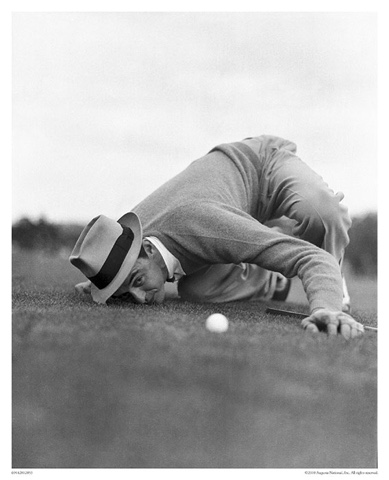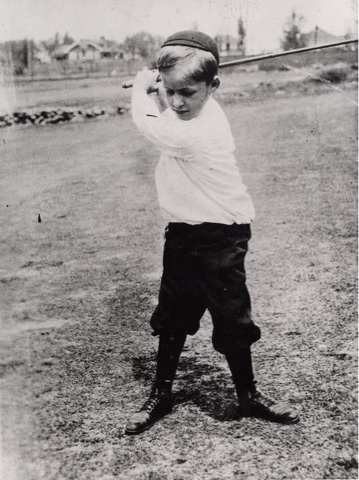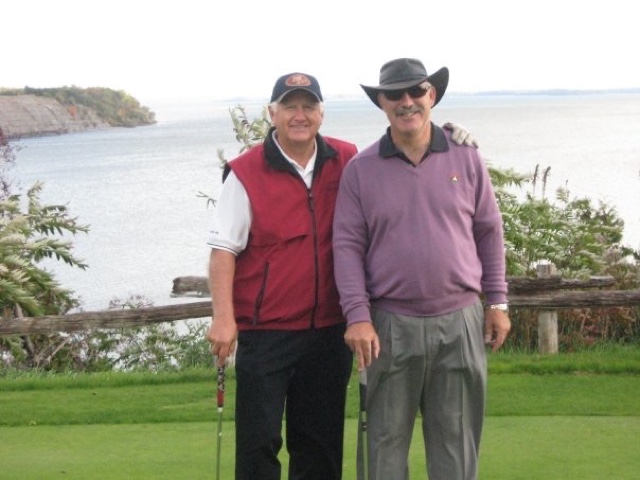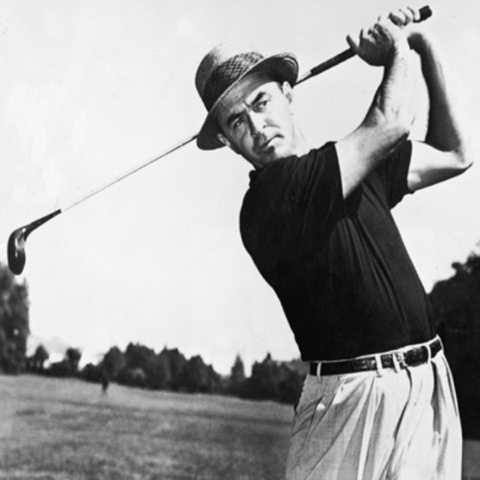The second requirement was a "one piece" takeaway for the first foot of the backswing. Arnie felt that it was almost impossible to screw things up if those two factors existed. The one-piece takeaway was also a key for Jack Nicklaus and Sam Snead, among many others.
For those who don't know what a one-piece takeaway is, it involves pushing the club straight back from the ball with the left hand, for a right-handed player. The right hand is simply along for the ride and the wrists don't begin to break and lift the club until the club has travelled at least a foot and the left side begins to move and stretch.
Arnie, unlike Jack or the Slammer, also recommended a relatively short, or compact, swing. He felt that there was no need to swing back any farther than is comfortable, the full shoulder turn being something you must either do naturally, or not worry about. He proved this in a test using a five iron, where he made a full swing, and then an abbreviated swing, the difference in distance being only about ten yards. The reward from the abbreviated swing was greater accuracy.
When you keep Arnie's teaching in mind and consider the famous ballstriker, Moe Norman's swing, you see that Moe incorporated Arnie's swing rules and was one of the straighest and most accurate hitters the game has ever seen. Moe realized early on that he was not a long hitter. His game had to be built around accuracy.
Everyone wants to hit the ball long. It's a great feeling. But most of us are either long hitters, or we're not. Long hitting is really something you either have the ability to do, or you don't. It's the result of rhythm, timing, strength, flexibility, and, most important, the ability to hit the ball in the sweet spot with a square clubface. All these things we can improve with practice and exercise. But most of us don't have the physical tools of a Dustin Johnson. So we need to focus on square hitting and accuracy, like Moe.
There are lots of people who have analyzed Moe's swing. They note the wide stance. They note the extended arms when he addressed the ball. They talk about his grip, and his tremendous lateral move through the ball. You can get lessons on how to swing it like Moe. And, perhaps these "Natural Golf" systems help struggling golfers.
Moe was a ballstriking genius. And, getting back to what Arnie had to say about the two prerequisites for good golf, consider what Moe did. For grip, he said he watched carpenters. He watched tennis players. And he realized that, for hiim at least. the club was best held more naturally, in the palms, not the fingers. That's why he used over-sized grips and a ten finger grip. With that grip, he struck the ball like a carpenter striking a nail. That clubface wasn't turning or twisting through impact. It was driving straight down the target line for, what Moe suggested was, twenty two inches.
When Moe addressed the ball, he had his club about a foot behind it. Remember what Arnie said about taking the club back twelve inches in one piece without breaking the wrists? Moe took care of that with his address position. He explained that he was already into his turn at address. By setting up this way he eliminated taking the club back outside the line, and he eliminated picking the club up too quickly, a problem that plagues many amateurs.
So someone learning the game might want to consider trying a ten finger grip, with thicker grips so that the club is held more in the palms. The one benefit of this is that it feels more natural to do this. And they might want to consider addressing the ball like Moe did, with the club a foot or so behind the ball. It would eliminate accidentally moving the ball at address, if nothing else. And it would ensure that magic one-piece takeaway that Arnie wanted to see.
Moe Norman was definitely a genius. And we can learn a great deal from understanding how and why he did things in his swing. And I think the most important thing is to understand how he struck the ball. After all, the swing is just a means to an end; the end being striking the ball correctly. There are no style points. So, how did Moe want to strike the ball?
Moe wanted his clubface square to the target and moving along the target line for as long as possible before and especially after impact. He wanted to be able to brush the ball off the grass. If he took a divot at all, he wanted it to be a perfect bacon strip, not a hole you could use to bury a small mammal.
Moe wanted to feel as though he could actually strike another ball twenty two inches in front of his ball. He practised that kind of extension through the ball and was convinced that this was what made him the straighest hitter we've ever seen.
Arguably the greatest ballstriker we've ever seen was Byron Nelson. He was a completely different body type than Moe, and his swing bore little resemblance to Moe's. But, guess what? He struck the ball the same way Moe did. He kept his clubface square and moving down the target line for a foot. He also employed a strong lateral move through the ball to accomplish this.
At the end of the day, there are as many ways to swing the club as there are golfers. But the only way to hit a straight shot is for the clubface to strike the ball squarely facing the target and moving straight down the target line. And whatever means you use to accomplish that is up to you. In the end, it isn't about the swing. It's all about the strike.



















